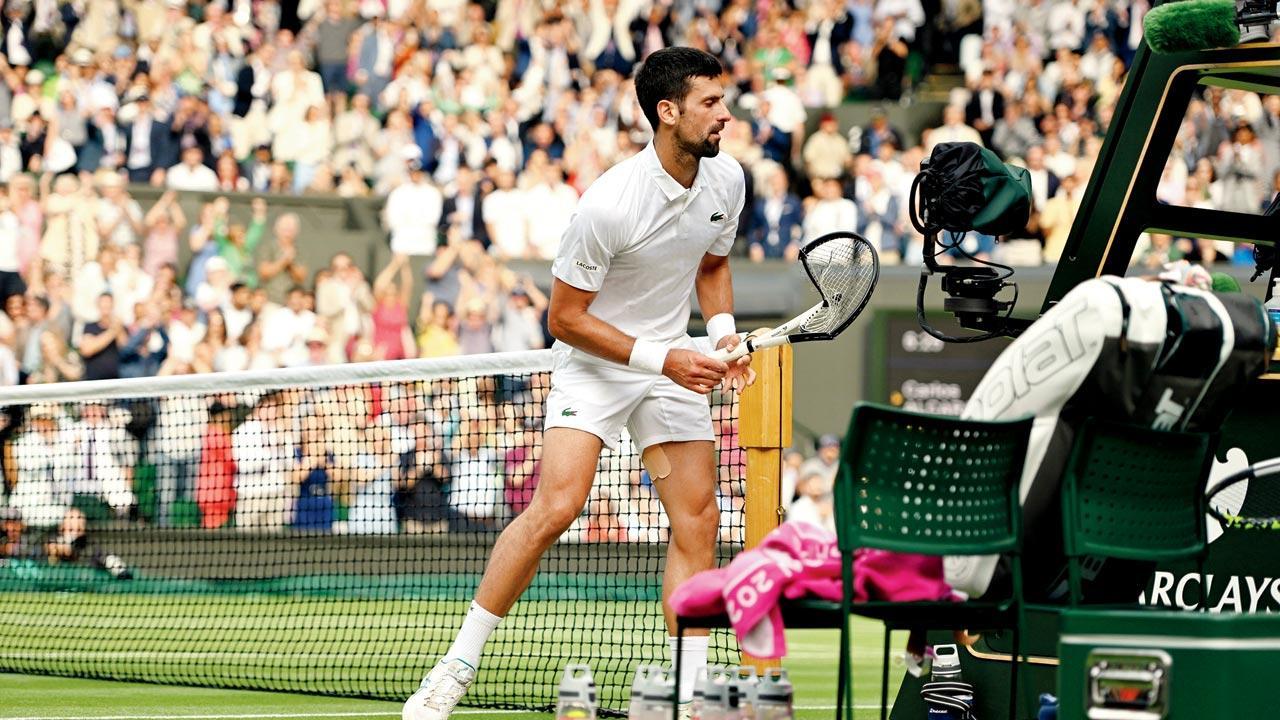Tennis ace Novak Djokovic is known not only for smashing records, but also for losing his cool when staring at defeat. Experts advise how to stay calm when faced with difficult workplace scenarios

Novak Djokovic smashed his racket after losing to Carlos Alcaraz at the Wimbledon Championships in London. Pic courtesy/Getty Images
Recently, the entire world witnessed tennis star Novak Djokovic smash his racket as hard as he could on the net support during the Wimbledon final that he went on to lose to young, rising star, Carlos Alcaraz. There’s an indication, he even hurt his wrist in the process and also faced a steep fine of $8,000, which is the highest individual fine that has been handed out during the tournament.
ADVERTISEMENT
One wonders what leads to this. How can a seasoned tennis player, a GOAT at that, with a fan-following of millions can become so visibly frustrated? Sure, the crowd was in support of the young Spaniard, and Djokovic also faced booing from the audience; but the high-pressure job has often led the Serb to have frequent meltdowns. Is there no other way to handle tough situations that one faces on the job?
 Try calming activities like meditation and deep breathing
Try calming activities like meditation and deep breathing
Mental strength mantras
In the intensely competitive world of sport, maintaining composure under pressure is crucial for athletes, and it’s no different in leadership positions at any corporate house. “Djokovic’s racquet-smashing incident during a high-stakes tennis match highlights the significance of managing emotions effectively,” says Jaya Mehrotra, a leadership coach.
“Much like Djokovic’s physical strength training that makes him an exceptional tennis player, leaders or bosses should also focus on emotional and mental strength training. Regularly practising mindfulness and emotional regulation techniques can help people stay centred and composed even in high-pressure situations,” she adds. Self-awareness enables leaders to manage their emotions effectively, making them less susceptible to meltdowns when faced with challenges.
 Jaya Mehrotra, Nipa Mehta-Sanghavi, Afsheen Dattoobhai and Eeshani Chakraverty
Jaya Mehrotra, Nipa Mehta-Sanghavi, Afsheen Dattoobhai and Eeshani Chakraverty
Identify the triggers
“If you can identify what angers you, you can mostly try to either distance yourself from those situations or try calming activities like meditation or physical exercise, that might help. It’s tough to do anything once the situation arises as anger is an impulsive response. In order to totally resolve these anger issues you need to try and understand yourself deeply,” explains Eeshani Chakraverty, psychotherapist.
Nipa Mehta-Sanghavi, clinical psychologist, says that in challenging situations, people need to identify that they are getting angry and accept that they are losing calm. “As soon as you know you are triggered, the first thing to do is to take a break of 15 to 20 seconds and analyse what about this situation is troubling you.” This gives one time to not react to a situation; but in fact, it buys time to respond in a more controlled and composed way.”
Say it right
She says that the immediate way to avoid a meltdown is to remove yourself from the place, physically. Maybe step out of the conference room or the cubicle; and walk away for a few seconds. Use that time off to take a few breaths. And then go back again to the difficult situation. “You will feel more equipped to deal with it. If there’s liberty of time and space, you can write down the response that you will share with the person or people that made the situation difficult in the first place,” adds Mehta-Sanghavi. When one takes a time-off for a few seconds or a few minutes, one ends up responding in a way that’s not aggressive.
Echoing the thought is Afsheen Dattoobhai, creative life and executive coach, “Taking deep breaths helps a lot as strong emotions like anger, create a physiological response as well. Hence, in addition to calming the body, these deep breaths allow you time and space to respond and not just react to the situation. Other techniques like counting to 10, or dismissing the very first thought that comes to mind seem to have a similar effect.” Humour, she says, works wonders to diffuse a sticky situation. “Though, be mindful of not using sarcasm, as it can hurt people.”
“When things aren’t going as planned, leaders should have a mental dialogue with themselves, just as Djokovic could have done during the match,” says Mehrotra. This inner conversation should involve acknowledging emotions, understanding triggers, and finding constructive ways to deal with the frustration. “By reframing negative thoughts and focusing on learning and growth, leaders can maintain their composure and lead effectively in challenging situations,” she adds.
Set achievable goals
Mehrotra points out that Djokovic’s frustration in the match might have stemmed from the mounting pressure to maintain his winning streak. Similarly, at workplaces, employees, especially senior leaders, often set expectations from themselves and others that may not always be realistic.
It’s essential to approach situations with a rational perspective, understanding that outcomes are not always entirely within one’s control. “Leaders should set achievable goals, focus on the process, and learn from both successes and setbacks. This approach helps them handle tough scenarios with a balanced mind-set and composure,” says Mehrotra.
Dig deeper
Anger is a normal human emotion, which rises out of frustration. It is mostly a cover emotion to something deeper, that one is either finding hard to express or hasn’t learnt to express. So being mindful and self-aware about things comes from a deeper understanding of the self.
“What triggers an anger response is very individualistic, and totally depends upon the unknown hurt that someone has. It’s this reason why some people might respond with anger to situations that might seem trivial to others. So, if you find yourself responding with anger often, either in specific situations or otherwise, it needs to be taken seriously and addressed by taking professional help,” concludes Chakraverty.
 Subscribe today by clicking the link and stay updated with the latest news!" Click here!
Subscribe today by clicking the link and stay updated with the latest news!" Click here!








